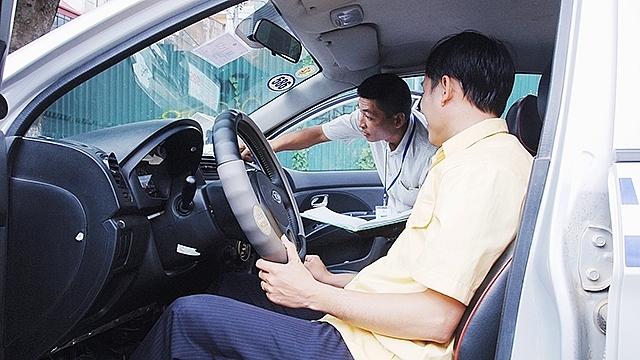Domestic firms launch ride-hailing applications to fill in Uber’s space
 |
| Domestic enterprises are accelerating plans to break into the ride-hailing market after Uber's withdrawal |
Mpos issues Fastgo ride-hailing app after three years of development
According to the plan, the Fastgo ride-hailing app will be officially launched on May 1, after three years of software development. The app is built by Mpos Vietnam Technology JSC, after the order of a large-scale taxi firms from Indonesia and Taxi Open99 Group from Vietnam.
According to Nguyen Huu Tuat, general director of Mpos, the Fastgo app can connect all taxi firms with online payment apps. Besides, personal vehicles can also use the app.
Fastgo offers advantages for both drivers and customers. Notably, with the exception of the fee to join the app, drivers will not have to pay commission to the operators of Fastgo. Customers will enjoy lower fares than with both traditional taxi brands and Grab. Besides, if any incident occurs during the trip, including traffic accidents or personal injured due to conflict with the driver, they will receive insurance.
At present, Fastgo is recruiting operation directors and business directors for its offices in Hanoi and Ho Chi Minh City.
Fastgo has yet to release its business strategy, however, with the careful preparation during the past three years, it is expected to become a heavyweight in the ride-hailing market.
Phuong Trang pours $100 million to develop Vato
According to the latest developments, Phuong Trang Futa Group, a leading passenger transportation and parcel delivery company in Vietnam, invested VND2.2 trillion ($96.53 million) into developing the ride-hailing app Vivu and changed its name into Vato.
Tranh Thanh Nam, the founder of Vivu (now Vato), told Vnexpress that according to the initial plan, Vato would have been launched in May this year, however, after Uber announced withdrawing from Southeast Asia, Phuong Trang Group decided to launch the app in Hanoi and Ho Chi Minh City this month.
| Khuat Viet Hung, vice chairman of the Vietnam National Safety Traffic Committee, said that the withdrawal of Uber from Vietnam is an opportunity for local taxi firms to take over the market. |
In reality, Vivu stared operations in March 2016 under the name FaceCar. It became famous for successfully mobilising $1 billion from Vietnamese overseas investors in Germany. However, the deal was not completed and FaceCar was renamed to Vivu.
According to Nam, Vato will not lure customers via promotion programmes. Instead, it has numerous advantages compared to its competitors.
Notably, drivers and customers can discuss the fare based on an initial fare issued by Vato. For example, after a customer orders a vehicle for a 5-kilometre ride, Vato will offer a fare of VND50,000, which the customer can then discuss with the driver.
Besides, Vato’s base fare is VND8,500 per km, similar to the fare of Uber, however, it only charges a 20 per cent commission, 5 per cent less than Uber.
Furthermore, once customers download the Vato app, they will be able to order vehicles from other taxi firms, including Mai Linh and Vinasun.
Vato’s joining will make the ride-hailing market more diverse, highlighting the appearance of Vietnamese players.
Along with Fastgo and Vato, another domestic firm that wants to set foot on the ride-hailing market is Skysoft’ Xelo.
According to Nguyen Truong Giang, the founder of the Xelo app, if domestic enterprises’ ride-hailing apps are invested methodically in collaboration with good customer support, they will have no difficulties in competing with foreign firms.
Khuat Viet Hung, vice chairman of the Vietnam National Safety Traffic Committee, said that the withdrawal of Uber from Vietnam is an opportunity for local taxi firms to take over the market.
What the stars mean:
★ Poor ★ ★ Promising ★★★ Good ★★★★ Very good ★★★★★ Exceptional
Themes: Ride-hailing services
Related Contents
Latest News
More News
- Japanese business outlook in Vietnam turns more optimistic (January 28, 2026 | 09:54)
- Foreign leaders extend congratulations to Party General Secretary To Lam (January 25, 2026 | 10:01)
- 14th National Party Congress wraps up with success (January 25, 2026 | 09:49)
- Congratulations from VFF Central Committee's int’l partners to 14th National Party Congress (January 25, 2026 | 09:46)
- 14th Party Central Committee unanimously elects To Lam as General Secretary (January 23, 2026 | 16:22)
- Worldwide congratulations underscore confidence in Vietnam’s 14th Party Congress (January 23, 2026 | 09:02)
- Political parties, organisations, int’l friends send congratulations to 14th National Party Congress (January 22, 2026 | 09:33)
- Press release on second working day of 14th National Party Congress (January 22, 2026 | 09:19)
- 14th National Party Congress: Japanese media highlight Vietnam’s growth targets (January 21, 2026 | 09:46)
- 14th National Party Congress: Driving force for Vietnam to continue renewal, innovation, breakthroughs (January 21, 2026 | 09:42)

 Tag:
Tag:





















 Mobile Version
Mobile Version